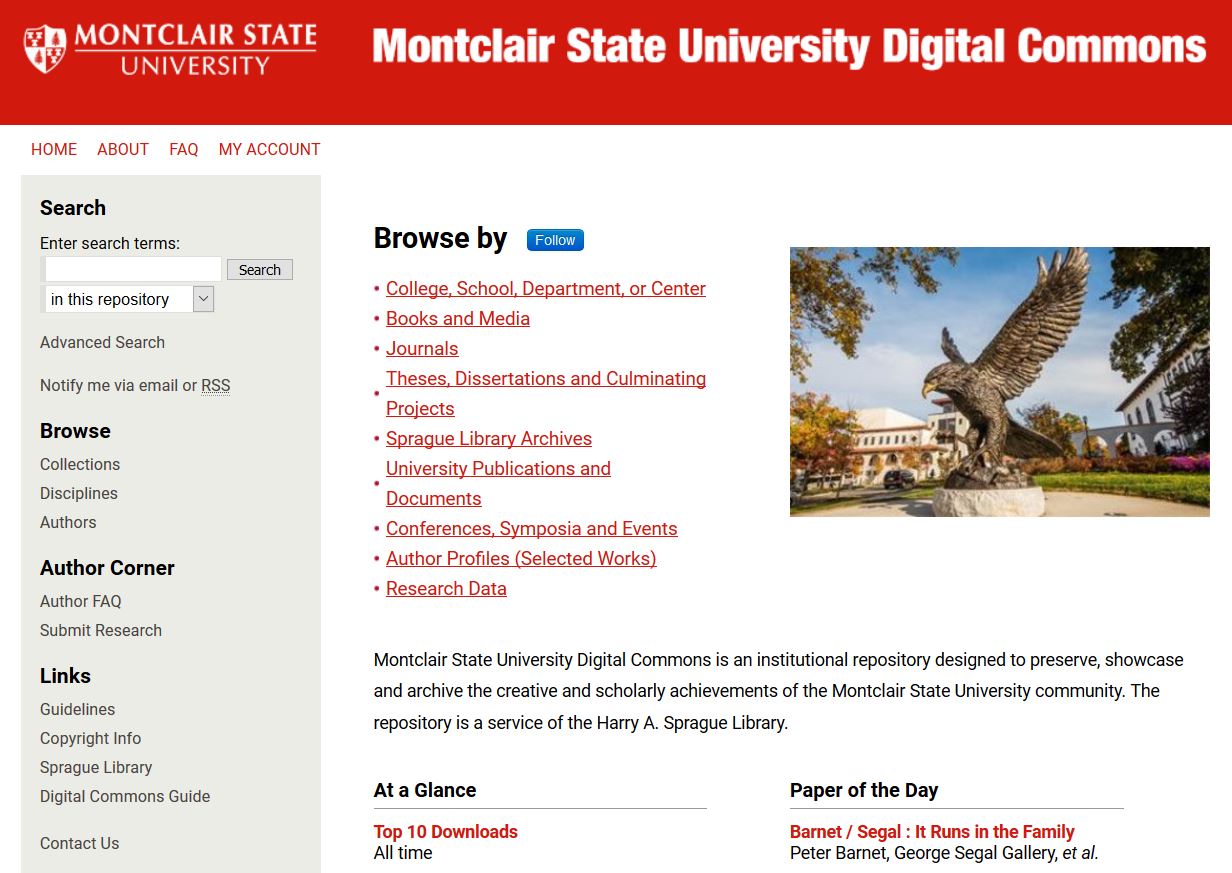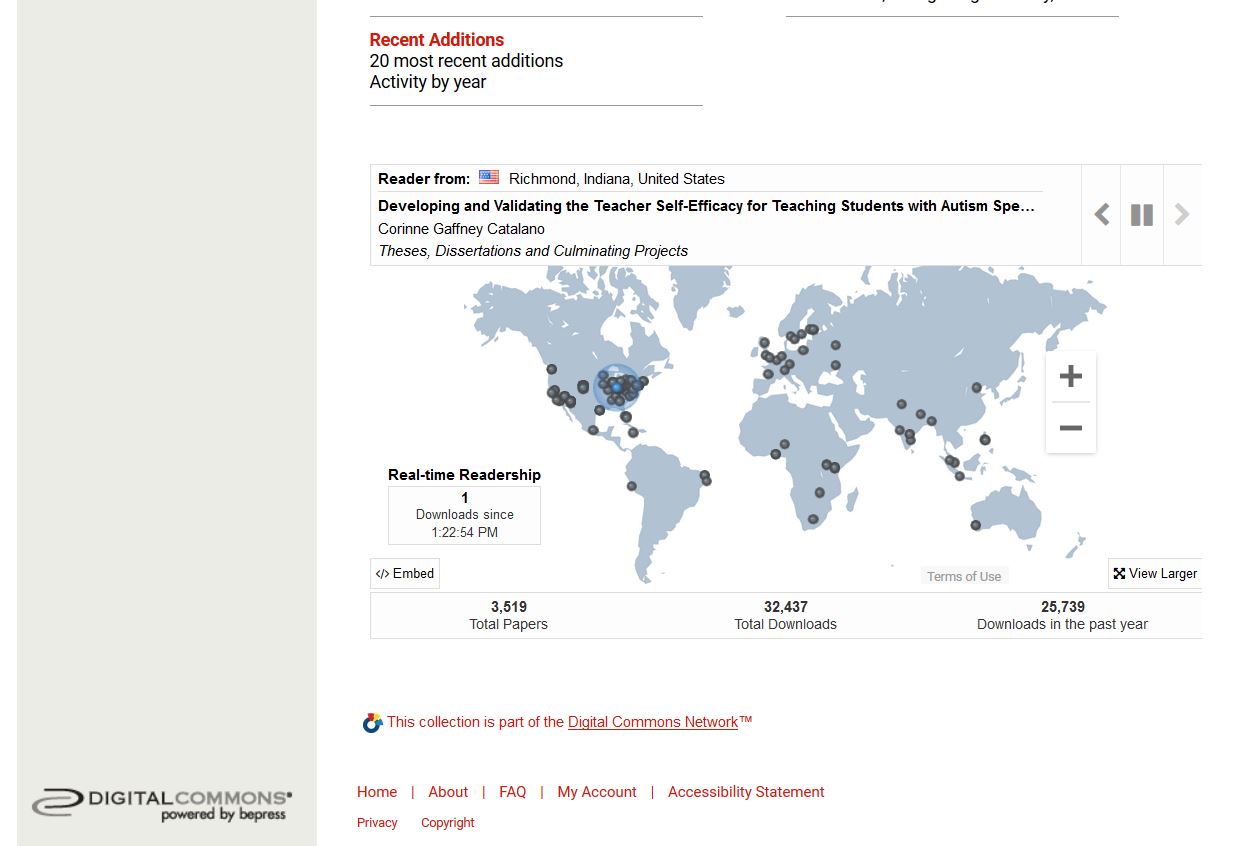Karen Ramsden, Research and Projects Specialist & Digital Commons Coordinator at Montclair State University (MSU), recently took time to share her best practices for reaching diverse stakeholders whose needs can be served through the university’s institutional repository (IR). Although Montclair State University Digital Commons is less than two years old, Karen’s background in higher education and fundraising led her to prioritize reaching out to key stakeholders – a strategy we’ve seen lead to great success. She was careful to align the IR with the university’s strategic goals from the very beginning; in MSU’s case, that means supporting research through publishing services and global dissemination. As Karen reports, “By capturing the intellectual output of Montclair State University, the repository provides visibility and influence to a worldwide audience, which, in turn, opens up new avenues for further research, innovation, and collaboration, and supports the University’s mission as a Carnegie-designated high level research doctoral university and state-designated public research institution.”
When working with people across campus, Karen explains, “I’m thinking about opportunities at every meeting and asking myself ‘How can the IR fit into this conversation or project?’” She addresses their concerns and practical needs, explaining “I’m always reassuring stakeholders – faculty starting journals, for example — that there won’t be any hidden costs by publishing in the repository.” Karen uses visual metrics available in the DC Dashboard to reach critical stakeholders such as faculty, administrators and higher administration. As she says, “What better way than showing them through the IR?” Here are a few of her outreach tips:
- Talk to people—it’s more powerful than emails. Remember that it’s a two-way conversation. Listen to their ideas, needs, interests—that’ll get them on board. I always get valuable ideas from talking with people on campus.
- Target each stakeholder differently; it’s very important to listen to each of their specific needs.
- When speaking with key stakeholders, invite higher admins like your dean to join you—it can help to have others in authority present with you to enroll faculty chairs, directors, presidents and provosts.
- Always look for opportunities to talk about your IR’s benefits. Find informal opportunities to chat or to give them your card. Always have a short “elevator pitch” handy.
- Keep your stakeholders aware by sending them reports such as metrics and maps in the DC Dashboard and emails about IR milestones. (After seeing these reports, fundraisers in the Development Office have shown interest in utilizing this information in presentations to show donors MSU’s research strengths.)
- Play to your strengths within your IR administration team. Some people are more comfortable with 1-1 conversations, some are great at group presentations, some excel in developing collateral.
- We found ETDs easiest to load into the IR, and they garner a lot of downloads which helps to show impact through DC Dashboard metrics, which in turn enrolls other stakeholders.
- Professors are very interested in hearing about research data management, which is important to them. The specific requirements keep changing so they really appreciate the library offering advice and solutions through the IR.
- Don’t get frustrated when there are bumps in the road, just keep your repository work aligned with your institution’s strategic initiatives so you are addressing key campus needs and keep in touch with stakeholders.
To learn more, join Karen on October 30th for the free webinar, “Montclair Levels Up: Supporting the Institutional Mission with Your Repository,” when she and Darren Sweeper will describe the challenges and successes of integrating their IR into a growing culture of research. Simply join the Digital Commons BrightTALK channel and scroll to the webinar to register. Topics will include:
-Aligning the institutional repository with strategic goals to give the library a seat at the table
-Engaging internal and external stakeholders with the IR
-Outreach to faculty on a changing campus
-Continuing to leverage the power of the repository over time









